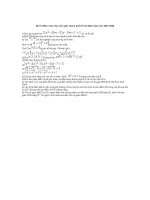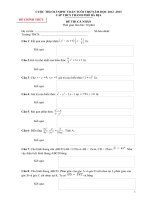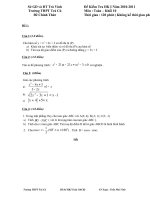Đề thi Olympic Toán học TMO năm 2005
Bạn đang xem bản rút gọn của tài liệu. Xem và tải ngay bản đầy đủ của tài liệu tại đây (102.21 KB, 3 trang )
<span class='text_page_counter'>(1)</span><div class='page_container' data-page=1>
注意:
允許學生個人、非營利性的圖書館或公立學校合理使用
本基金會網站所提供之各項試題及其解答。可直接下載
而不須申請。
重版、系統地複製或大量重製這些資料的任何部分,必
須獲得財團法人臺北市九章數學教育基金會的授權許
可。
申請此項授權請電郵
<b>Notice: </b>
<b>Individual students, nonprofit libraries, or schools are </b>
<b>permitted to make fair use of the papers and its </b>
<b>solutions. Republication, systematic copying, or </b>
<b>multiple reproduction of any part of this material is </b>
<b>permitted only under license from the Chiuchang </b>
<b>Mathematics Foundation. </b>
</div>
<span class='text_page_counter'>(2)</span><div class='page_container' data-page=2>
<b>AITMO PROBLEMS – Team Contest </b>
1.. <i>Refer to the diagram. Quadrilateral ABCD with diagonals BD</i> and
<i>AC bounds the rhombus EFGH as shown in the figure. If BD</i> <i>k</i>
<i>AC</i> = ,
||
<i>EF</i> <i>AC</i>, and <i>FG BD</i>|| , find Area
Area
<i>ABCD</i>
<i>EFGH</i> .
Solution:
Let =λ
<i>AB</i>
<i>AE</i>
, then <i>EH</i> <i>BD</i>
<i>BD</i>
<i>EH</i>
<i>BA</i>
<i>BE</i> <sub>=</sub> <sub>−</sub><sub>λ</sub> <sub>=</sub><sub>λ</sub> <sub>=</sub><sub>λ</sub>
,
,
1 . Similarly, <i>EF</i> =
(
1−λ
)
<i>AC</i> <i>, but EH=EF, so </i>that
λ
⋅<i>BD</i>=(
1−λ
)
⋅<i>AC</i> andλλ
−
=
= 1
<i>AC</i>
<i>BD</i>
<i>k</i> , then
<i>kH</i>
1
=
λ .
Hence
(
) (
)
<i>k</i>
<i>k</i>
<i>k</i>
<i>k</i>
<i>EH</i>
<i>BD</i>
<i>EF</i>
<i>AC</i>
<i>EH</i>
<i>EF</i>
<i>BD</i>
<i>AC</i>
<i>S</i>
<i>S</i>
<i>EFGH</i>
<i>ABCD</i>
2
1
1
1
1
1
1
2
1
1
1
1
2
1
2
1
sin
sin
2
1
2
+
=
+
+
+
=
−
=
⋅
=
⋅
⋅
⋅
⋅
=
λ
λ
ϑ
ϑ
.
2. Prove or disprove: 100 consecutive positive integers can be placed around a circle so that the product
of any two adjacent numbers is a perfect square.
Solution:
<i>3. How many triples (a, b, c) of positive integers are there such that a, b and c are primes and </i> 2 2
<i>a</i> −<i>b</i> =<i>c</i>?
Solution:
The unique ordered triple is (3, 2, 5).
4. <i>Find the smallest positive integer k such that !k</i> ends with 500 zeros.
[Note: <i>k</i>!=<i>k k</i>
(
−1)(
<i>k</i>−2 ... 3 2 1) ( )( )( )
]. Solution:
<i>k=2005. </i>
5. <i>Let x = a + b – c, y = a + c – b and z = b + c – a, where a, b and c are prime numbers. Given that x</i>2<i> = y </i>
and
(
<i>z</i>− <i>y</i>)
<i> is the square of a prime number, find the value of the product abc. </i>Solution:
<i>abc=3*23*29=2001 </i>
6. <i>The real numbers x</i>1 <i>, x</i>2 <i>, x</i>3 <i>, x</i>4 <i>, x</i>5 <i>, x</i>6 are arbitrarily chosen within the interval (0,1).
Prove that
(
1 2)(
2 3)(
3 4)(
4 5)(
5 6)(
6 1)
1
16
<i>x</i> −<i>x</i> <i>x</i> −<i>x</i> <i>x</i> −<i>x</i> <i>x</i> −<i>x</i> <i>x</i> −<i>x</i> <i>x</i> −<i>x</i> ≤ .
Solution:
7. The number 222+1 has exactly one prime factor greater than 1000. Find it.
Solution:
(
2 1)
2(
2 1 2)(
2 1 2)
2113*1985 2113*397*51
222+ = 11+ 2− 12 = 11+ + 6 11+ − 6 = =
</div>
<span class='text_page_counter'>(3)</span><div class='page_container' data-page=3>
8. We can assign one of the integers 1, 2, 3, …, 7 (with no repetitions) to each
of the seven regions in the diagram so that numbers in adjacent regions
(having a common edge) differ by 2 or more.
<i>How many different values are possible for region g? </i>
Solution:
7.
9. <i>Three motorists A, B, and C often travel on a certain highway, and each motorist always travels at a </i>
<i>constant speed. A is the fastest of the three and C is the slowest. One day when the three travel in the </i>
<i>same direction, B overtakes C. Five minutes later, A overtakes C. In another three minutes, A overtakes </i>
<i>B. </i>
<i>On another occasion when they again travel in the same direction, A overtakes B first. Nine minutes </i>
<i>later, A overtakes C. </i>
<i>When will B overtake C? </i>
Solution:
15 minutes.
10. Divide the diagram into pentominoes so that the sum of
the digits within each part is 10. The pentomino shapes
are shown below. They can be rotated or reflected. Each
must be used exactly once in the problem.
Solution:
3 2 1 3 2 2 2 3 1 1
1 1 5 2 1 2 3 1 4 1
3 2 1 2 4 2 3 2 1 2
2 1 1 2 2 1 1 5 2 1
4 3 2 4 2 1 2 2 1 1
2 1 1 2 1 2 1 1 4 2
Example
<i>a</i> <i><sub>b</sub></i> <i>c</i>
<i>d</i> <i>e</i> <i>f</i>
</div>
<!--links-->









